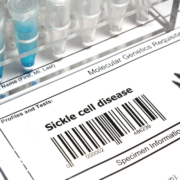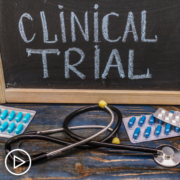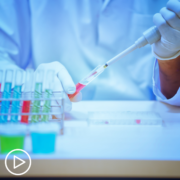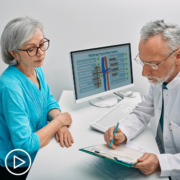What Are Renal Medullary Carcinoma Noted Disparities?
What Are Renal Medullary Carcinoma Noted Disparities? from Patient Empowerment Network on Vimeo.
What are the disparities seen in renal medullary carcinoma? Expert Dr. Nizar Tannir explains how grassroots movements are so important in rare diseases like renal medullary carcinoma and his hope for equitable policy change.
Dr. Nizar Tannir is a Professor in the Department of Genitourinary Medical Oncology, Division of Cancer Medicine at The University of Texas MD Anderson Cancer Center.
[ACT]IVATION TIP
“My activation tip is work with your representatives in Congress with your local politicians and with different organizations to raise the decibel to try to make this happen and I hope it will happen in the near future.”
Download Guide | Descargar Guía
Related Resources:

|

Why Renal Medullary Carcinoma Clinical Trial Participation Is Pivotal |

Biomarker CA-125 and Renal Medullary Carcinoma: What Do We Know? |
Transcript:
Cora:
Dr. Tannir, what are the noted disparities seen in RMC and what are some of the actions being taken?
Dr. Tannir:
RMC affects predominantly African Americans in this country. Unfortunately when you say African American and healthcare, in the same sentence, there it is, there is healthcare disparity. Healthcare disparity is a fact we live in, is something I face all the time in our citizens who are minorities, people of color in this country, whether they’re African American or Hispanic or other citizens.
Unfortunately, they don’t have the same healthcare access to like other patients, like other individuals. So that right there is a healthcare disparity. We need to remove those barriers and that’s the only way we’re going to address healthcare disparities, is by making it not disparity anymore. And how you do that, you give healthcare access, equal healthcare access to those individuals, because those individuals want to live, people want to live, people want to take care of themself, of their bodies, their health, they want to live longer, they want to be cured if they have cancer. But we have to provide them the access to the best, be it the treatments that are available right now even clinical trials, even clinical trials of drugs that may not be FDA-approved, they should have access to those as well, they’re equal citizens in this country.
They have to have access. The same way I have access, if I got cancer, I have access to clinical trials at MD Anderson. A patient with RMC should have that same equal healthcare access. I hope that this, it takes a village, as they say, it takes a village for all of us to work together, it’s not going to happen overnight this is going to be grassroots like you, Cora, are doing, grassroots movement from the ground up. Healthcare policies will change only when all the citizens in this country realize and believe that healthcare is a right, it’s not a privilege, it is a right, it is a right. The most important right is health, life high, this is important so the only way we can achieve that is when we believe as a country, as citizens of this country, that we’re all equal, God has created us equal. We have to have access to healthcare. My activation tip is work with your representatives in Congress with your local politicians and with different organizations to raise the decibel to try to make this happen, and I hope it will happen in the near future.
Share Your Feedback:
Create your own user feedback survey






